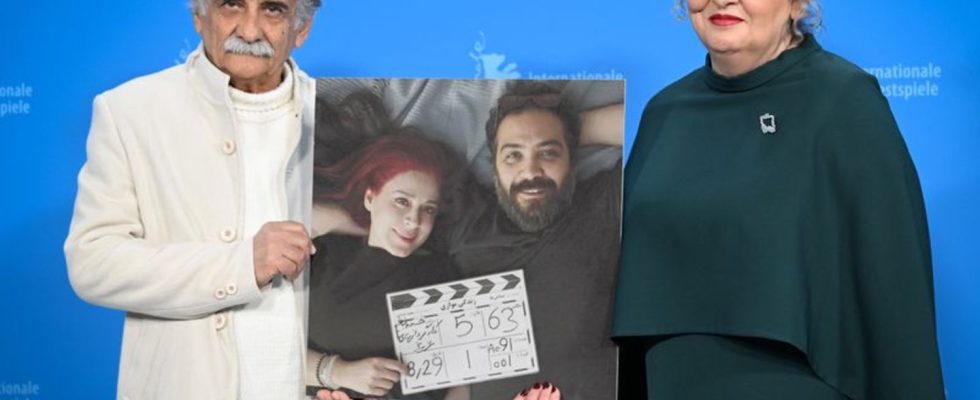Berlinale
Despite the travel ban: standing ovation for Iranian film duo
The actors Esmail Mehrabi (l) and Lily Farhadpour (r) came to the Berlinale without their directors – but showed them in a photo
© Soeren Stache/dpa
The Iranian directing duo Maryam Moghaddam and Behtash Sanaeeha were not allowed to travel to the Berlinale. But they were also able to convince with their work. Things get political elsewhere too.
The Iranian director duo was banned from leaving the country Maryam Moghaddam and Behtash Sanaeeha have positioned themselves with a clear message about his film and the situation in Iran.
“We have decided to overcome all red line restrictions this time and accept the consequences of our decision to paint a real picture of Iranian women,” said a statement from the two, which was read by actress Lily Farhadpour in Berlin.
The premiere of “Keyke mahboobe man” (“My Favorite Cake”) as part of the Berlinale competition was celebrated frenetically by the audience. Even before the presentation, there was a standing ovation for Farhadpour and her film partner Esmail Mehrabi. The applause lasted for minutes after the film. Farhadpour repeatedly held up a large photo of the absent director duo Moghaddam and Sanaeeha.
Going to bed with a hijab – the hurdles of Iranian censorship
The film tells the story of a 70-year-old widow who rediscovers her love life in old age after the death of her husband. On the surface, it seems to be a film that primarily thinks about love and self-determination in old age. However, its ambiguity makes it an intelligent portrait of society.
Farhadpour pointed to one of the omissions in Iranian films due to censorship. It is taboo for older women to fall in love again.
Women also do not wear a hijab when sleeping. “People laughed when women in the films went to bed wearing hijabs,” said Farhadpour about the use of the head covering.
“Keyke Mahboobe man” is polarizing in the country whose state religion is Islam. “Iranian women have been fighting against unjust laws such as the compulsory hijab and the lack of equal rights for years,” said the directing duo.
The directing duo regretted not being able to present their film themselves. “We are sad and exhausted, but we are not alone,” Maryam Moghaddam wrote on Instagram. “That’s the magic of the cinema. The cinema connects us with you.”
Filming in secret
The filming began before the wave of protests led by women in autumn 2022. The uprisings were triggered by the death of the young Iranian Kurdish woman Jina Mahsa Amini. The notorious moral guards arrested the young woman, she fell into a coma and died a few days later. This was followed by the most serious protests since the founding of the Islamic Republic, which Iran’s government violently suppressed.
According to the filmmakers, filming was carried out as secretly as possible while street demonstrations continued.
After the protests, which brought mainly young people onto the Iranian streets under the slogan “Woman, Life, Freedom”, more and more filmmakers who expressed their solidarity with the movement found themselves in the crosshairs of the judiciary. Just in October, more than a dozen famous film personalities were banned from working.
The directing duo Moghaddam and Sanaeeha had already entered the Berlinale in 2021 with the film “Ballad of the White Cow”. This film was also considered highly controversial, politically charged in Iran and broke several taboos.
Cries of “Free Palestine” at the Berlinale film “No Other Land”
During its premiere at the Berlinale, the Palestinian-Israeli filmmaker collective of “No Other Land” took a stand against the director’s stance on the Middle East conflict and described Israel as an apartheid state. The four filmmakers called for a ceasefire in Gaza, but did not further define their stance against the Berlinale director.
The documentary “No Other Land” is about the displacement of Palestinians in the villages of Masafer Yatta, south of Hebron in the West Bank. The film shows how the Palestinian Basel Adra documents the gradual demolition of the villages in his home region by soldiers on behalf of the Israeli government. Israeli journalist Yuval Abraham begins to support him in his efforts. “No Other Land” was filmed in October 2023; the Hamas massacre against Israel is only mentioned in passing in the film.
After the film, individual spectators in the hall shouted slogans such as “Free Palestine” – two men who called for peace for Israel and Palestine were shouted down and insulted.
The Berlinale’s leading duo described the film festival in mid-January as a platform for peaceful dialogue regarding the Middle East conflict. Mariette Rissenbeek and Carlo Chatrian emphasized that their condolences go out to all victims of the crises in the Middle East and beyond. “We want everyone’s suffering to be noticed and our program to open up different perspectives on the complexity of the world.”

